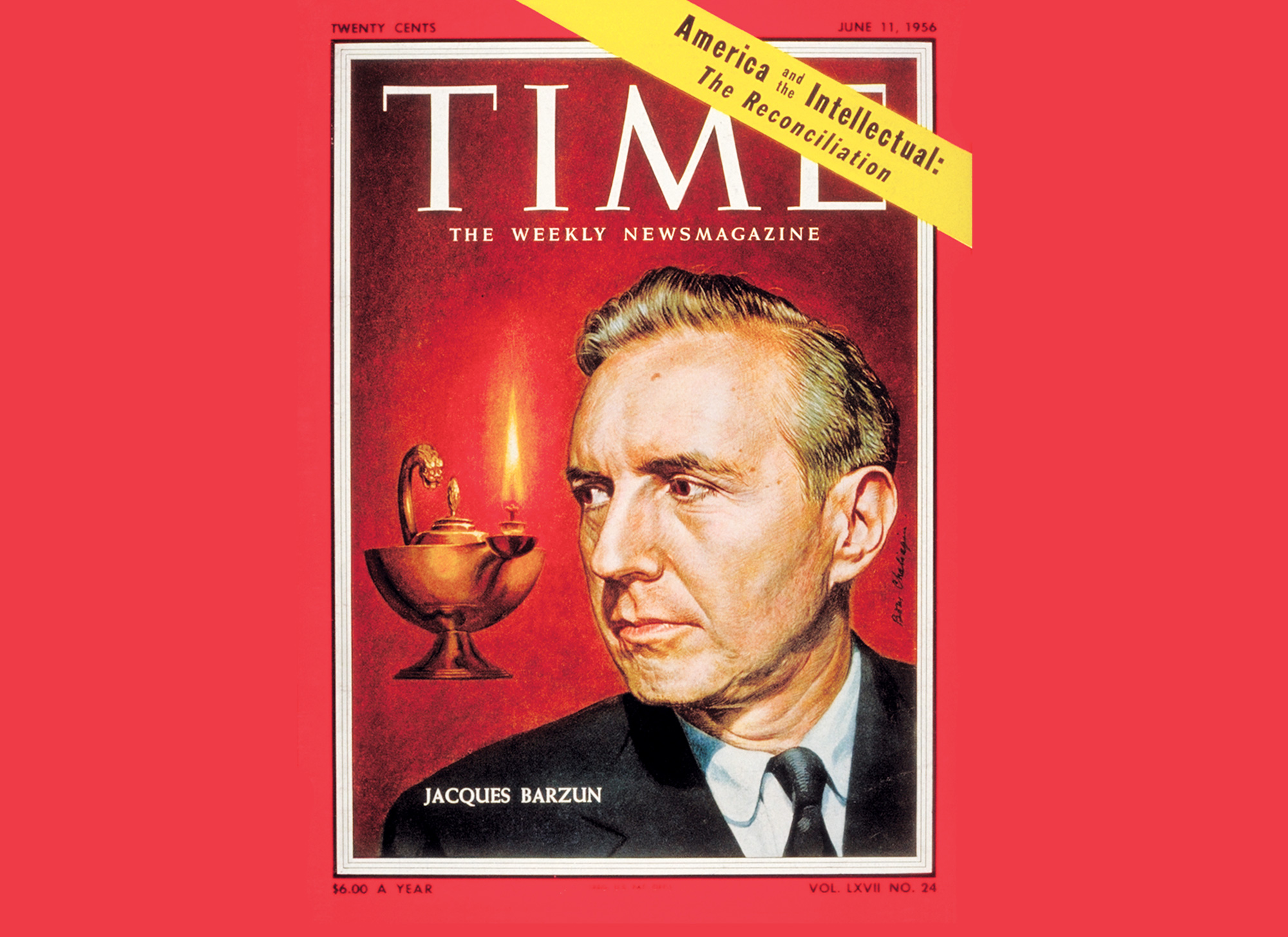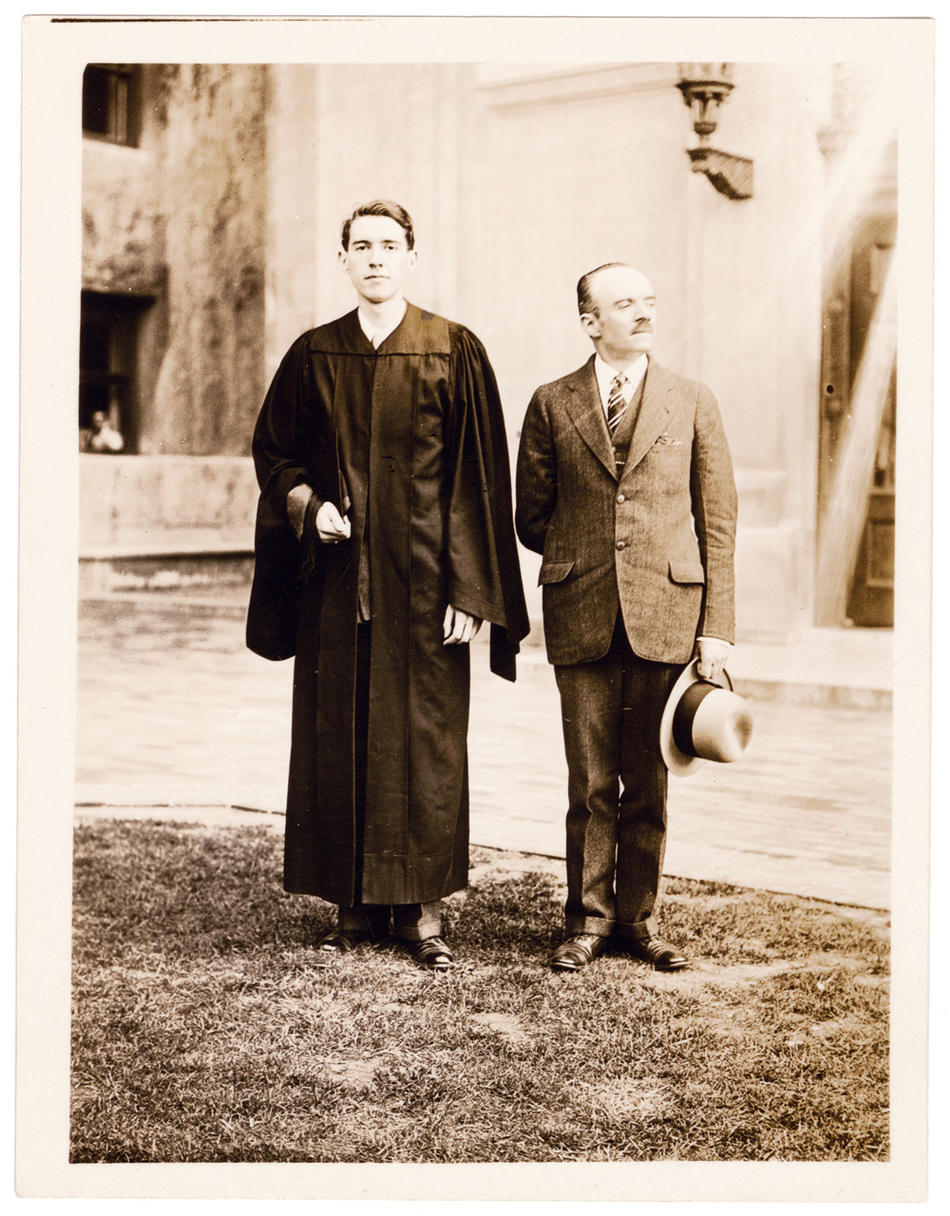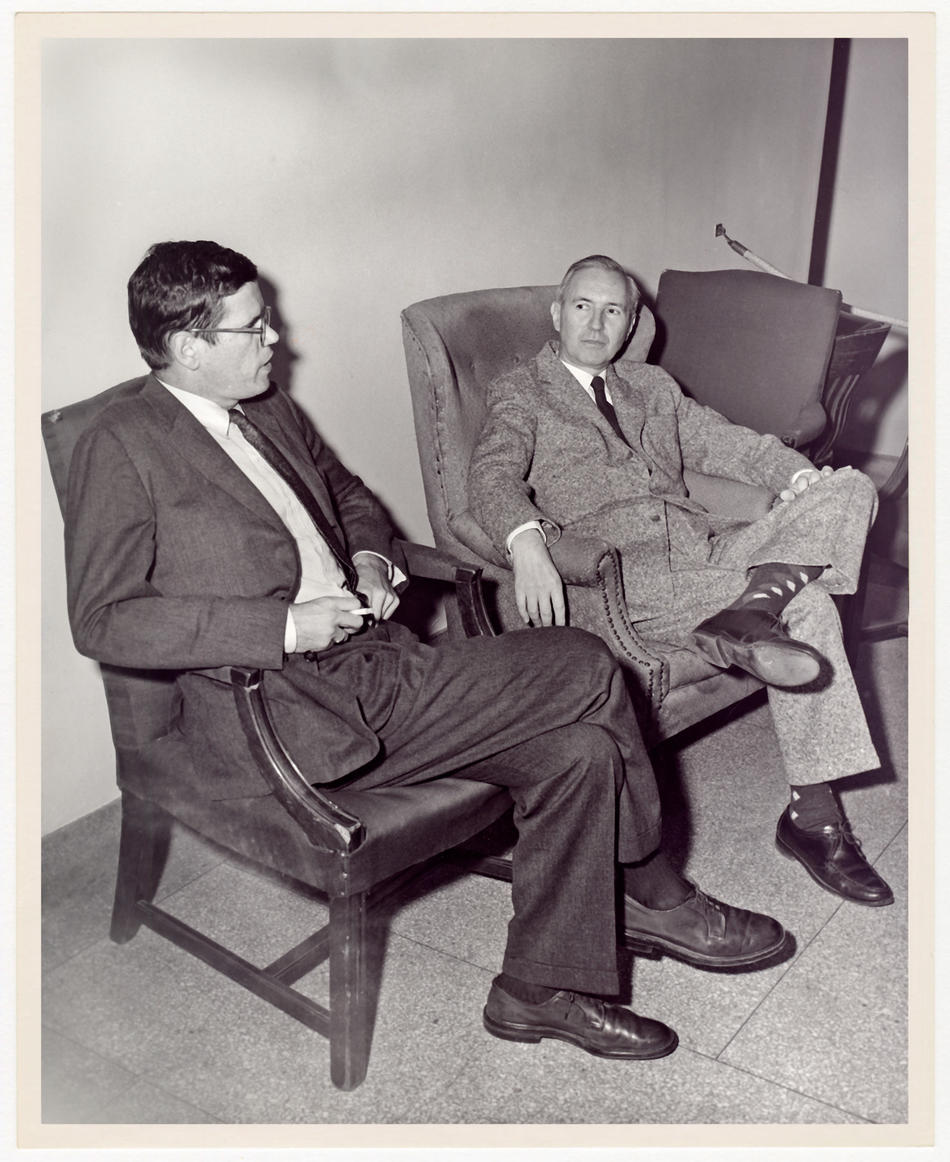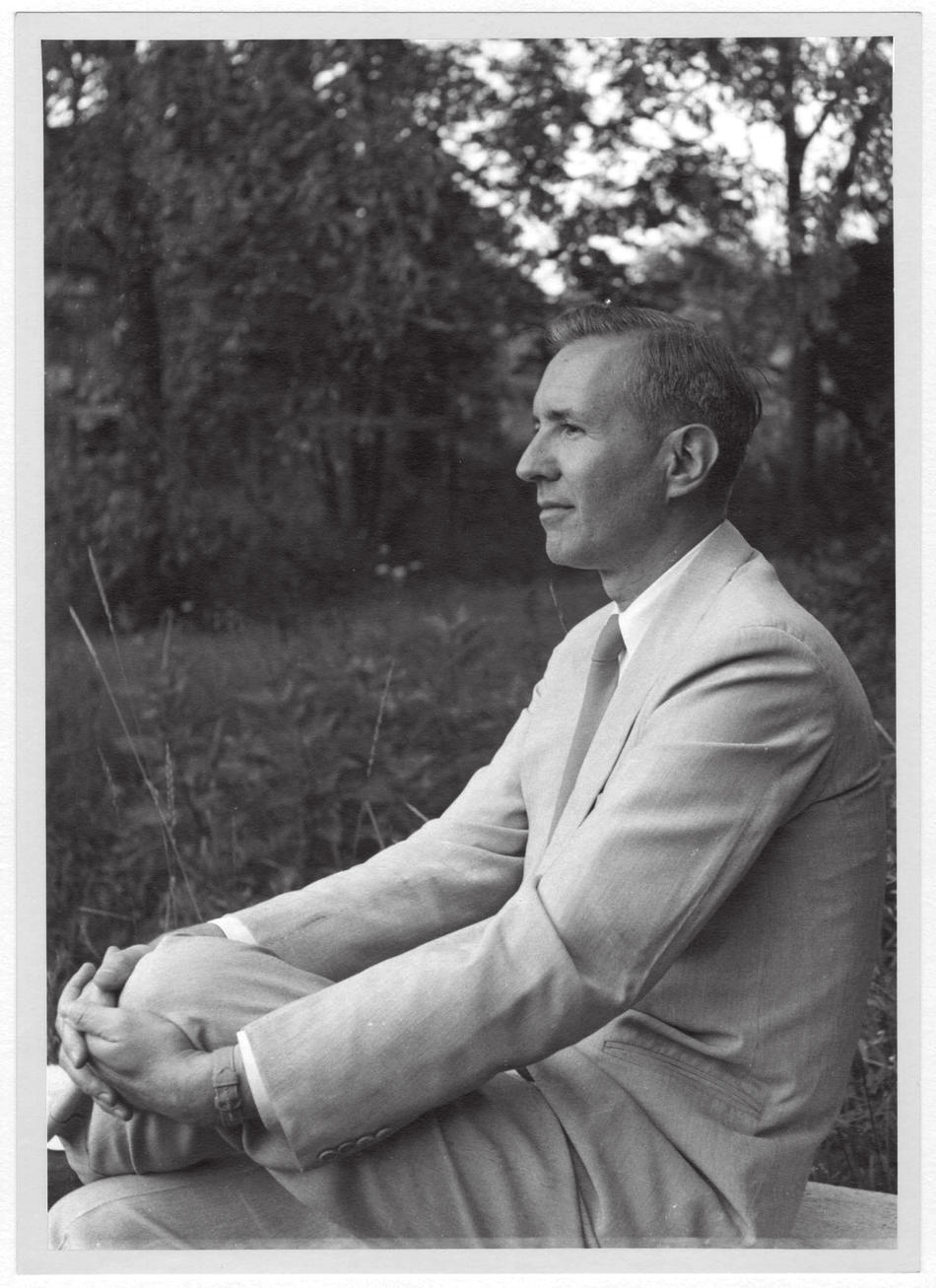
I knew Jacques Barzun ’27CC, ’32GSAS mostly from the Mid-Century Book Society, the second book club he headed with the poet W. H. Auden and the Columbia professor Lionel Trilling ’25CC, ’38GSAS (with whom Barzun taught a renowned graduate seminar from 1946 until 1972). I was associate editor and in charge of the society’s magazine, in which books offered to the members were reviewed by the editors, and later by an occasional guest as well. Of course, one had to sell these books, in both senses of the word; but that was neither too hard nor dishonest, given that they were really good books we all liked.
It fell to me to edit this illustrious triumvirate for the magazine, a very different task with each writer. Auden, who was jovially insouciant, handed in smart but sloppy stuff that needed a lot of editing, which he readily and gratefully accepted. Trilling was more difficult. Always by telephone, one went over proposed changes, some of which, after some discussion, he accepted, some not.
Barzun, however, one was not allowed to edit. Everything, down to the last comma, had to be left as it was, even where — an admitted rarity — improvement was possible. When we spoke on the phone, I could conjure up my interlocutor. He was undoubtedly smiling his frosty smile, one part convivial and two parts condescending. Since he was tall, the smile, when delivered in person, would literally descend upon you, accompanying an elegant diction that itself had a sort of smile in it.
His figure and posture were excellent, and he wore his well-tailored clothes with an aura more diplomatic than academic. His accent was upper-class American, without a trace of his French childhood. I always wanted to address him in French, to hear how he would sound in that language, but I lacked the guts to do so.
Even though he generally spurned what I would call human warmth, his eyes had an encouraging glitter when the conversation was about one art or another — or history, or philosophy — which, in my presence, it almost always was. Baseball, too, with those who shared his interest. Often, though, the conversation turned to the art of correct and appropriate language, which was one of his passions, and about which, happily, we were invariably of the same opinion.
I had not then and, I’m ashamed to say, have not even now read most of his books, not really even those I owned. The two-volume Berlioz and the Romantic Century never left my shelf before I sold it along with a number of my books, all of which I came to miss.
Barzun was not, like Auden, someone to feel warmly about, but he was certainly one to respect. He produced a steady stream of ex cathedra utterances that one could not help admiring. (It was he who taught me, for example, that “could not help but” was redundant.)
He was always, like Auden, reciprocally respectful of me (which Trilling never overtly was, although he several times said he envied my wardrobe). Here is Barzun’s blurb for my book Singularities:
Not because he is violent in expression but because he feels strongly and thinks clearly about drama, about art, and about conduct, I think John Simon’s criticism extremely important and a pleasure to read. And by the way, who has decreed that violence in a playwright is splendid and violence in a critic unforgivable?
Only two book reviews in my long career have I been unable to deliver. One was of a biography of the Pre-Raphaelite painter Edward Burne-Jones that I read in galley form, only to wait so long for the finished book, with its all-important reproductions, that by the time it arrived, I had forgotten much of what I wanted to say about the text.
The other was of Michael Murray’s 2011 Jacques Barzun: Portrait of a Mind, which comprises, with comments, profuse and lengthy extracts from Barzun’s writings. I tend to run penciled lines in the margins along the passages I wish to quote; here, however, the lines were near ubiquitous. I struggled unsuccessfully with triage but finally gave up in despair. Barzun’s output — on literature, history, philosophy, biography, and cultural criticism, and also music, teaching and research, English style and usage, and crime fiction, not to mention masterly translations of major French fiction and drama — was copious and all of the highest quality. The authorial portrait of a mind boggles the reader’s.
I recall Murray’s last chapter, “Late Years,” which deals with, among other subjects, the very hefty From Dawn to Decadence: 500 Years of Western Cultural Life, 1500 to the Present. The book was published in 2000, when Barzun was 92, and it ran some 700 pages. In it, Barzun stated his firm belief that our culture has become decadent and is in unarrestable decline, but that, in an as yet unforeseeable future, a fresh culture would arise.
A very different Barzun from the one I knew emerges in “Late Years” — more modest and adaptable. Concerning From Dawn to Decadence, Barzun writes to his editor, “I want every opportunity to improve my work through the remarks of choice readers. And I mean comments of every sort: clumsy wording, too much on one topic, risky generality about our own time, dull stuff — the lot.”
In a 2004 letter to the historian John Lukacs, he writes, “If I did let go ... I would exceed all bounds and be put down as a mad professor, fit only to associate with helpless students ... I long ago learned to curb the spontaneous Ciceronian invective I might enjoy discharging from time to time.” There are gems in these late letters, as, for instance, when he lectures the language guru William Safire about the difference between a ship that is moored and one that is merely anchored. Heaven only knows how he came by such nautical intelligence.
There are charming aperçus. “We live longer, it is true, but often without much enjoyment of old age.” And: “One should not live to so advanced an age. One tends to become indifferent to things one should not be indifferent about — manifestations of good and evil in the world, for example, or the obligations ... incurred when people ask something of one.” And: “I think that in the 19th century and much of the 20th it was quite normal for gentlemen ... not to talk about the ladies they took an interest in, epistolary or amorous or even marital as distinct from amorous. I get the impression, from letters and biographies, that to discuss or even mention a new ‘interest’ would be indelicate, for if precisely specified it would sound egotistical, even boastful, and if left vague, would lead to regrettable speculation.” How wonderful from a man ninety-four years old.
“I keep thinking that I’ve been enormously lucky,” he writes, and avers that he has no regrets about his life choices, even though becoming an academic was “a kind of Why not? instead of a Yes, by all means.”
He was certainly right about our dumbed-down age, and that a “dégringolade” (a French word signifying a catastrophic downward hurtling) is taking place. May he also be right about the better future, which, to be sure, not even a child just born and living to be 104 will necessarily live to see. But hope and striving for it are not small potatoes either, and in this disciple of William James and Bernard Shaw they were always there.





